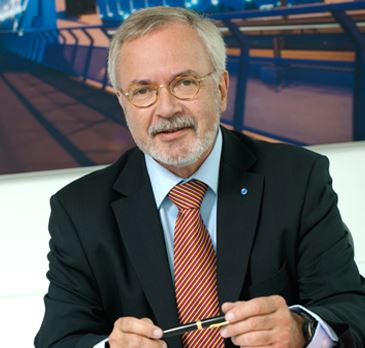European Investment Bank: Bank at the Heart of Europe’s Crisis Response
When the leaders of international financial institutions and development banks gathered in Washington DC for their bi-annual meeting a few weeks back, the key focus was somewhat different from the previous ones – for the first time in years, the spotlight was not on the economic crisis in Europe.

Airport of Porto and Faro – Portugal: The project consists of a mix of investments at the seven airports in Portugal owned and operated by ANA, primarily aimed at improving safety and service standards and alleviating specific operational and capacity constraints. The main investments are at the mainland airports of Oporto, Faro and Lisbon; the smaller investments are at the four airports which serve the islands in the Azores archipelago off the west coast of Portugal.
That our situation no longer elicits raised eyebrows and worried glances among our international partners is no accident. An unprecedented downturn has been met with unprecedented reform efforts – which have yielded some encouraging results. The situation in Europe is still delicate, but we now see the light at the end of the tunnel.
A Coherent Strategy to Tackle the Crisis
For quite some time now, member states and EU institutions have followed a coherent anti-crisis strategy based on five major building blocks:
- At the national level, the EU member states have been undertaking major, and often painful, adjustments to consolidate national budgets and improve competitiveness via structural reforms and better spending patterns.
- New rules have been applied at the EU level to strengthen the oversight of national budgets.
- The European Central Bank (ECB) has continued to play a crucial role. Its unprecedented liquidity support has been key in preventing a systemic credit crunch as well as a confidence crunch.
- Resources have been pooled by the European Financial Stability Facility and the European Stability Mechanism to extend financial support more effectively and to signal commitment to fight financial contagion.
- To address investment gaps and contribute to growth and employment creation, the European Investment Bank has significantly increased its lending.
These efforts have already started to bear fruit. Fiscal imbalances are being reduced. External adjustment has taken root and unit labour costs have declined sharply in the hardest-hit EU countries, some of which already see their exports grow in real terms. Risk premiums on peripheral sovereign debt have been on a downward trend.
“The EIB has assisted economic development in the region for several decades.”
Much has been achieved to underpin the EU economy and the euro, although more reforms needed to be completed to protect the currency – in particular we need to move ahead with the banking union, necessary for the euro area countries to better manage and contain financial sector risk.
At the same time, the economic crisis lingers. There is substantial underinvestment in many areas that are essential to our competitiveness. Gross fixed capital formation contracted massively early in the crisis and has remained feeble, almost 20% lower than five years ago.
A collapse of investment activity of this magnitude has inevitable repercussions for economic expansion in the longer term. If productive capital stocks do not grow – indeed, if they are not even maintained – our growth potential will inevitably shrink.
A revival of investment activity is therefore needed. This is where public finance providers such as the European Investment Bank come into play.
Significantly More Lending
Established by the Treaty of Rome in 1958, the European Investment Bank (EIB) is the only financial institution which is legally bound and technically equipped to serve all 28 of its shareholders – the EU member states. It has the top credit standing, a balance sheet of more than half a trillion euro and is the largest supranational lender and borrower in the world.
The Triple-A rating enables the EIB to borrow on the finest terms available. As a self-financing institution, and operating on a not-for-profit basis, the EIB Group – consisting also of the European Investment Fund, a risk finance subsidiary – passes on this advantage to its clients for the financing of investment projects. EIB conditions – interest rates, but also the maturity of the loan – are more favourable than what our clients would obtain elsewhere.
As an integral part of the European crisis response, the EU Bank made a deliberate U-turn, moving from a pro-cyclical to a clearly counter-cyclical course. This has been made possible by EIB shareholders, the 28 EU member states, who decided to substantially strengthen the capital base by paying in an extra EUR10 billion – new capital used as a cushion for new financing operations.
As a result of this capital injection, the Bank stepped up its lending activities by more than 40%, targeting annual loan signatures of nearly EUR70 billion from 2013-2015 in support of growth and job creation in Europe. In particular, the EIB Group seeks to safeguard access to long-term financing for small and medium-sized business, with the target for SME and mid-cap support in the magnitude of €20 billion for 2013.
The other priority areas of the bank’s Growth and Jobs Initiative include research, development and innovation, resource efficiency and strategic infrastructure.
New Instruments
Also, in response to the crisis to offer efficient and tailor-made instruments, the EIB widened its tool-box and rolled out some brand-new, mostly guarantee-oriented products.
In Greece, the bank signed its first Trade Finance Facility, acting as a safe bridge between leading Greek and foreign banks to the benefit of Greek importers and exporters. This facility has since been replicated in Cyprus.
Again in Greece, the EU Bank set up an SME guarantee fund. The fund is a joint initiative between the Hellenic Republic, the European Commission and the EIB. Established by using EUR500 million from unabsorbed structural funds for Greece, the fund will guarantee EIB loans to SMEs via partner banks in Greece totalling up to EUR1 billion.
In Portugal, the EIB signed an innovative Portfolio State Guarantee, providing for a lending envelope of up to EUR6 billion over the next years. Another area to support growth and jobs is the Europe 2020 Project Bond Initiative. This initiative provides an opportunity for re-opening capital markets as a source of financing for crucial transport, energy and communications infrastructure.
By layering structural funds with alternative sources of funding and assuming different levels of risk and return, the EIB Group has proven that the concept remains an effective way of mobilising public and private funding, achieving greater leverage than alternative methods of financing.
Furthermore, the European Investment Fund (EIF) – as part of the EIB Group – is a powerful tool to address market gaps. The bank – as its largest shareholder – stands ready to strengthen the EIF by extending its mandate of up to EUR5 billion over seven years to be implemented at the beginning of next year.
Also, an EIF capital increase of up to EUR1.6 billion has been envisaged, which has seen a general positive initial feedback from the shareholders.
The EU Bank is also working to mitigate market fragmentation. The Bank developed the SME Initiative, which is a joint attempt with the European Commission, aimed at stimulating SME lending through financial institutions. This SME initiative would combine budgetary contributions from Structural Funds (ESIF) and other EU programmes (COSME/Horizon 2020) with EIB Group’s own resources.
Another major social and economic challenge for the European Union and the EIB is youth unemployment. For this purpose, the EU Bank launched a dedicated programme titled Skills and Jobs – Investing for Youth with a lending volume of EUR6 billion for job-related skill gaps, vocational training schemes, student loans and mobility programmes for young employees.
A Key Market Player
However, the EIB is not a one-sided political institution. It is also a bank which is borrowing on highly competitive markets. Thus it is of utmost importance to continue to demonstrate both investors and international rating agencies that the EIB pays the highest attention to a geographically well-balanced portfolio in all 28 EU member states supporting strong and viable projects that ensure stable earnings with a likewise stable capital adequacy ratio under a conservative risk management with an eye to strict internal regulatory compliance rules.
The EIB is taking this very seriously and has just been rewarded by Standard & Poor’s which revised its outlook for EIB from AAA negative to AAA stable – against an environment where most of our shareholders do not currently have a top rating.
Looking Beyond the Current Downturn
The financial and economic crisis has brought to the fore one key question: Is Europe ready to remain an attractive continent and a competitive place at the edge of technological advance?
The answer is not simple. Of course we have to continue to tackle the crisis. But we also have to look beyond the current downturn because international competition has sharpened.
In particular, investing in research, development and innovation is critical for Europe if we do not want to be side-lined by new actors in the global game. Our future wealth will depend on how successful we are as innovators – that means how fast we convert ideas into products and services. Reinforcing the knowledge triangle has a positive impact not only on competitiveness, but also on fighting poverty, social exclusion and inequality.
We have to continue the necessary structural reforms and we have to put a strong emphasis on innovation. Then I am confident that Europe will come out of this crisis more unified, stronger and fit to continue playing its role as a key global political player.
The role of the EIB in this process is clear-cut: The EU Bank is fulfilling its duty, supporting the structural renewal of the EU economy to re-emerge as a highly competitive economic power in a globalized world.
About the Author

Author: Werner Hoyer
Werner Hoyer has been president of the European Investment Bank and chairman of its board of directors since January 2012. Previously, from 2009 to 2011, he was German deputy foreign minister responsible for political and security affairs, European affairs, and the United Nations and arms control. In this position he was also commissioner for Franco-German cooperation. Dr Hoyer held the position of deputy foreign minister and Minister for EU affairs between 1994 and 1998.
Dr Hoyer is a longstanding member of Germany’s Free Democratic Party (FDP). He has served as whip, deputy chairman and foreign and security affairs spokesman of the parliamentary group. He was a member of the Bundestag for more than 20 years. Dr Hoyer has also served as president of the European Liberal Democratic Reform Party (ELDR) in Brussels.
Prior to his political career, Dr Hoyer worked in academia. He was director of the economics and information department at the Carl Duisberg Society and associate lecturer and senior research assistant at the University of Cologne from which he holds a doctorate degree in economics.
You may have an interest in also reading…
Is AI the Future for Spreadsheets?
By Gianluca Bisceglie Until just a few years ago, there was no real alternative to Excel. If you wanted to
Boutiques Bet Big on 2025: Talent Wars and the Push for Revenue
The investment banking sector is gearing up for what could be a transformative year in 2025. Following a year of
Modern ‘Alchemy’: No Spells and Incantations, Just a Focus on Integrity — and Excellence
CFI.co in conversation with Emad Shahin, investment director at Ethra Invest… Investment and private equity are facets of the financial

















































































